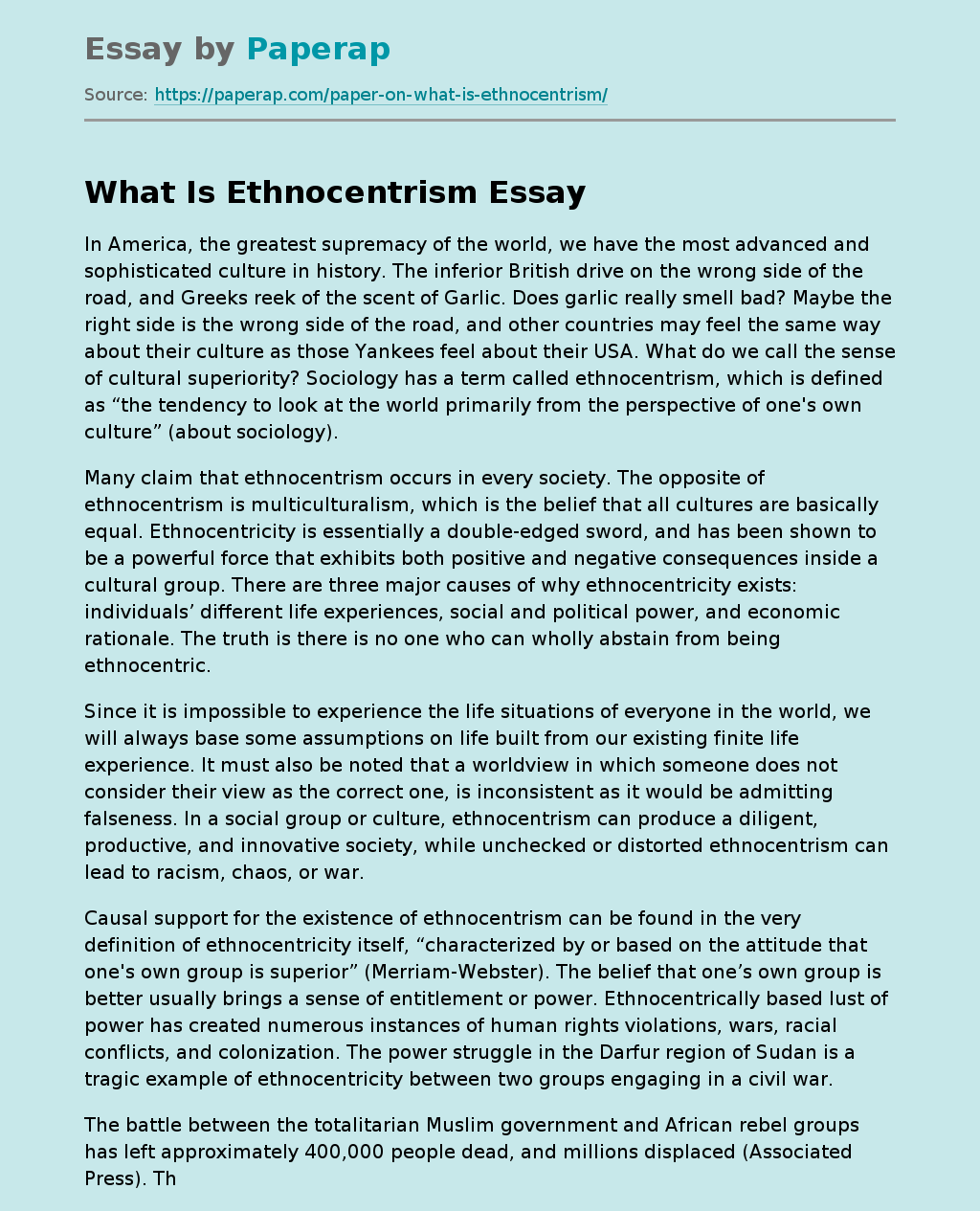Now We Will Find Out What Ethnocentrism Is
Many claim that ethnocentrism occurs in every society. The opposite of ethnocentrism is multiculturalism, which is the belief that all cultures are basically equal. Ethnocentricity is essentially a double-edged sword, and has been shown to be a powerful force that exhibits both positive and negative consequences inside a cultural group. There are three major causes of why ethnocentricity exists: individuals’ different life experiences, social and political power, and economic rationale.
The truth is there is no one who can wholly abstain from being ethnocentric.
Since it is impossible to experience the life situations of everyone in the world, we will always base some assumptions on life built from our existing finite life experience. It must also be noted that a worldview in which someone does not consider their view as the correct one, is inconsistent as it would be admitting falseness. In a social group or culture, ethnocentrism can produce a diligent, productive, and innovative society, while unchecked or distorted ethnocentrism can lead to racism, chaos, or war.
Causal support for the existence of ethnocentrism can be found in the very definition of ethnocentricity itself, “characterized by or based on the attitude that one’s own group is superior” (Merriam-Webster). The belief that one’s own group is better usually brings a sense of entitlement or power. Ethnocentrically based lust of power has created numerous instances of human rights violations, wars, racial conflicts, and colonization. The power struggle in the Darfur region of Sudan is a tragic example of ethnocentricity between two groups engaging in a civil war.
The battle between the totalitarian Muslim government and African rebel groups has left approximately 400,000 people dead, and millions displaced (Associated Press). The Sudanese government has been accused of supporting the Arab terrorist group Janjaweed commit genocide throughout the country with an aim to annihilate the African insurgent groups that want a larger share of influence in the Sudanese government. The ethnocentric view of national imperialism has greatly affected most developing nations around the earth.
An illustration of imperialism would be the European nations’ colonization of Asian nations. After monopolizing many Asian countries’ resources by gaining control of their trading ports and routes, the Europeans impressed much of their cultural ideals on these nations. As a result, people living under the British came to adapt their culture to match the British perspective. The colonies’ commercial interests, education and other concepts revolved around the British. The same occurrence happened to colonies under the Dutch, French and Spanish too. 831 was the year that Alexis de Tocqueville coined the term American Exceptionalism, which refers to the belief that qualitatively the United States differs from other developed nations, on account of its unique credentials, origins, and political system. This national pride has helped the United States in the past, including declaring their independence from being a British colony, and winning the Revolutionary War.
Abraham Lincoln had a pro American Exceptionalism outlook and said, “My dream is of a place and a time where America will once again be seen as the last best hope of earth. Critics of American Exceptionalism argue that the United States is not the only country founded as a republic with those ideals, and they feel that foreign policy has been economic self-interest than an actual desire to spread their ideals.
A case for American Exceptionalism rationale can be made because of statistics that show that that the United States has the largest Gross Domestic Product (GDP) of any nation in the world at 14. 265 trillion dollars (worldsrichestcountries. com), and a Gallup poll states that Americans generally are happy,” More than 8 in 10 Americans say they are satisfied with their personal lives at this time. So while obviously there are many problems in the United States, American Exceptionalists have ethnocentric pride in their culture. Additionally, economic systems are reasons for ethnocentricity, whether it is socialism, capitalism, or communism. The majority of citizens that inhabit most socialist and capitalist countries believe that their system is better since they have not experienced living in a dissimilar economic environment. One needs to look no further than Korea for the occurrence of economic ethnocentrism.
North Korea, one of the worlds most centrally directed and least open economies has a GDP of only 40 billion dollars according to the website CIA. gov. As a result of governmental control and lack of free enterprise, a large proportion of North Korean citizens suffer with poor living conditions and malnutrition which is a serious predicament. South of the border, South Korea has a more open economic policy and therefore has the 15th largest GDP in the world of 1. 364 trillion dollars. Ethnocentricity is inevitable; my very writing about the subject is from an ethnocentric point of view.
Applied correctly, ethnocentrism produces a diligent, productive, and innovative society, while unchecked and perverted ethnocentrism is leading to many atrocities happening all around the world. Cultures must learn to embrace and accept other groups’ differences, and learn from the positive and useful aspects of other societies. An ethnocentric philosophy is necessary in order to recognize violations of basic human rights, and just like in science, grounded understandings are not developed from the complete absence of bias, but instead the recognition and control of biases.
Now We Will Find Out What Ethnocentrism Is. (2017, Apr 06). Retrieved from https://paperap.com/paper-on-what-is-ethnocentrism/

